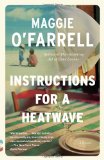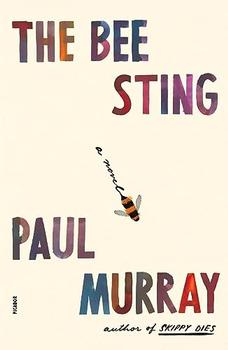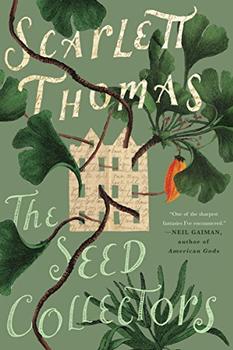Summary | Excerpt | Reading Guide | Reviews | Beyond the book | Read-Alikes | Genres & Themes | Author Bio

Maggie O'Farrell's novel Instructions for a Heatwave investigates family, lies, and the ways they intertwine. One morning, during England's record-breaking 1976 heat wave, Gretta Riordan sees her husband Robert off for his errands as she does most mornings since he retired. He does not return that day or the next. There is little preparation for his disappearance and the family is thrown into turmoil. Gretta and Robert's three children - Michael Francis, Monica, and Aoife (pronounced Ee-fuh) - are in their own tumultuous states and no one is prepared to search for Robert. Each of the siblings harbors a secret, and all of them struggle with the burden of being raised by Catholic parents with strict moral rules.
Michael Francis wonders if his wife Claire still loves him. His job as a high school history teacher is unfulfilling and a disappointment after his great plans of moving to America and pursuing a history Ph.D at one of the country's top universities were ended when he married. Claire, frustrated by her own failed dreams, has started to pursue an open-course history certificate, a program that Michael Francis believes is far beneath her. Claire and Michael Francis are at a crisis point in their marriage, and Robert's disappearance threatens a relationship already rocked by mistrust.
In contrast to Michael Francis, Monica is on her second marriage. She is married to Peter, who has two daughters. The daughters detest Monica, and she wonders why she tries so hard to live this challenging life with a man she barely understands. She hates the hulking Victorian farmhouse that Peter refuses to renovate and doesn't understand why he won't encourage his daughters to be kinder to her. In all, this second marriage is nothing like her first, when she was married to her high school sweetheart Joe. Monica and Joe were supposed to have the perfect life until their dream of having a family was destroyed. Monica wonders if her marriage to Peter, life in their mausoleum of a house and the rejection by his daughters is penance for decisions that were made while she was married to Joe.
While Michael Francis and Monica struggle to understand how to resolve their issues within the context of their current relationships, Aoife believes that there is little that can be done about hers. Aoife cannot read. She artfully keeps this fact hidden from everyone, and though it causes frustration and discomfort, she accepts her limitation. Aoife's childhood was challenging, she was often at odds with her mother who struggled to accept her, but she is the happiest of the three siblings. Aoife's move to New York takes her away from the pressure of her family and gives her the confidence to accept herself. This distance, something that Michael Francis and Monica have struggled to find, helps Aoife understand her own idiosyncrasies and those of her family. Despite Aoife's relative sense of balance compared to her siblings, however, the issue of her illiteracy looms. She has not been able to read contracts or deposit checks for her boss, a successful photographer who relies on Aoife's organizing skills. If her boss discovers the folder of ignored paperwork, Aoife could lose her job.
Circling around the mystery of Robert's disappearance and the siblings' various crises is the unrelenting heat. The novel does not dwell on the physical discomforts of the heat, and it becomes clear that the high temperature functions as a limiting factor in both the literal and figurative senses. The heat bears down on the characters, applying pressure to bring about change. Perhaps Robert would have remained at home if not for the heat, and without his disappearance none of his children would have been jarred from their constricting lives and forced to change. If the title of the novel were to be taken literally, and the novel read as an instruction manual about what to do in a "heatwave," it becomes clear that the solution is to air out dark corners of family life. It is by doing this, the story suggests, that family members can lead the life they were meant to lead.
Though the novel ostensibly hinges on the search for Robert, the true engine of the narrative is the three siblings' journeys of personal change. Robert's unexpected departure throws the image of the perfect family that Gretta has strived to create, out the window. With their parents' presentation of perfection no longer the guiding model for their own lives, the siblings are free to assess what really makes them happy. O'Farrell's investigation of these three characters, all related by blood but astoundingly different, creates a vibrant portrait of what it means to create the life you want, versus the life you were conditioned to have.
O'Farrell's novel is remarkable for its character development - each of them leaps off the page. Her flair for creating suspense is highlighted here in the slow unfolding of each player's story. Though the ending leaves some unanswered questions (such as why Robert chose to leave and how Clare and Michael Francis will resolve the trouble in their marriage), the novel is a delight. Fans of O'Farrell's earlier work will enjoy this newest addition from one of Britain's top writers.
![]() This review was originally published in The BookBrowse Review in July 2013, and has been updated for the
May 2014 edition.
Click here to go to this issue.
This review was originally published in The BookBrowse Review in July 2013, and has been updated for the
May 2014 edition.
Click here to go to this issue.

If you liked Instructions for a Heatwave, try these:

by Paul Murray
Published 2024
From the author of Skippy Dies comes Paul Murray's The Bee Sting, an irresistibly funny, wise, and thought-provoking tour de force about family, fortune, and the struggle to be a good person when the world is falling apart.

by Scarlett Thomas
Published 2017
The Seed Collectors is a tale of inheritance, enlightenment, life, death, desire and family trees by a literary star in the UK.
Your guide toexceptional books
BookBrowse seeks out and recommends the best in contemporary fiction and nonfiction—books that not only engage and entertain but also deepen our understanding of ourselves and the world around us.